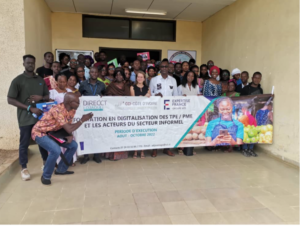To support small and medium-sized enterprises (SMEs) in the digitalisation process, the ACP-DIGI project, implemented by Expertise France as part of the DIRECCT programme, relies on the Chambers of Commerce and Industry of Benin, Côte d’Ivoire, Ghana and Togo to strengthen the capacity of small and medium-sized enterprises to withstand COVID and subsequent crises.
SMEs represent around 90% of the entrepreneurial fabric and between 50% and 70% of employment in West Africa. That’s why this project has selected 800 SMEs and trained 3,500 people, 50% of whom are women.
“Giving companies the best”
To support the competitiveness and digital maturity of their small businesses, whether formal or informal, the Chambers of Commerce have run training courses for entrepreneurs in the capital cities and in the regions. The aim of these training courses:
“Accompany businesses in the digitalisation process to bring a plus to the economy through a digital strategy for the private sector in order to monitor and give the best to these businesses” The Director of Business Assistance of the CCI of Togo, Yawo Seyenam Kavege
For 20 months, the Chambers of Commerce have been going through a study process to (1) identify the needs of entrepreneurs and (2) produce tools tailored to their needs. The entrepreneurs are now in the training phase (3). This personalised training is designed to meet the real needs of member companies:
— Improving the digital skills of managers and employees
— Develop a digital strategy, in particular by optimising your company’s presence on social networks
— Adopting e-commerce technologies to export sales
— Improving efficiency, legitimacy and transparency
— Raising awareness of gender and climate issues

“Ensuring connectivity and competitiveness in the marketplace”
At the end of the identification phase, several types of needs and issues emerged.
The Tinga project in Togo has focused on passing on digital skills and ensuring that they are taken on board in the medium term. Depending on the needs of each of the businesses in the programme, the trainers installed the necessary software for accounting, marketing, e-commerce and personnel management. The trainers then introduced the companies to the software. Each trainer looks after five companies. In all, around fifty companies have been trained in digital tools. Ultimately, the aim of training these businesses in digital technology is to boost 3 major issues in Togo: poverty, employment and the development of digital infrastructures.
In Côte d’Ivoire, the I-Djaouli project has created digital hubs to enable beneficiary companies to come together and pool their strategies in a digital ecosystem. By acquiring new digitisation tools, beneficiaries can open up to the national, regional and international markets. This digital service is a genuine strategy for resilience to future crises. The project leader, Adja Salimata Sanogo, talks about the benefits of developing these synergies:
“We are seeing the impact of our work on the ground because we have taken care to take into account the needs of the programme’s beneficiaries, who have themselves become involved in the training courses and have learnt new digital tools. This programme has enabled us to create a digital hub so that beneficiaries can get together, discuss and possibly talk about the future of the digital ecosystem”
The marketing and distribution of products is also at the heart of the work of the Ghana Chamber of Commerce and Industry: today, the digitisation project extends to different regions and is helping almost 800 businesses. Of these, 40% are now able to sell their products online via pages on social networks and e-commerce platforms.
In Benin, all six economic regions are benefiting from the E-Tchité project. By September 2023, 1,000 Beninese businesses should be participating in this project. They will be trained in digital marketing, which will provide them with the key skills they need to sell and distribute their products using digital tools, and in computerised business management – in this case, digital technology is helping to formalise small businesses.

Finally, as part of the DIRECCT project, the Chambers of Commerce met in Paris for capitalisation workshops in October 2022 to pool their dynamics, share their ideas and strengthen their synergies. They also met on 1 December 2022 for training on impact monitoring and evaluation in order to assess the number of SMEs initiated and having adopted digital solutions. In fine:
“This project is a real response to a concern arising from a situation that is external to all our countries, and particularly to business leaders. Studies have shown that companies committed to digitisation have been more resilient to the effects of the pandemic. So this project is helping to raise awareness among SMEs of the need to get involved in the digitisation process”, Camarou Bello, E-Tchité project focal point.
